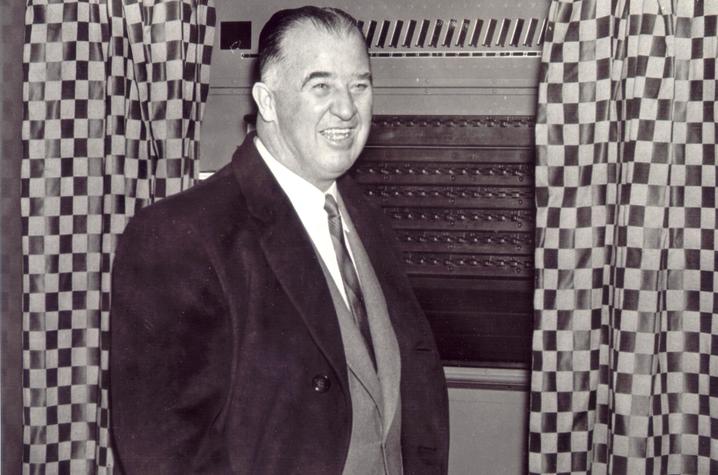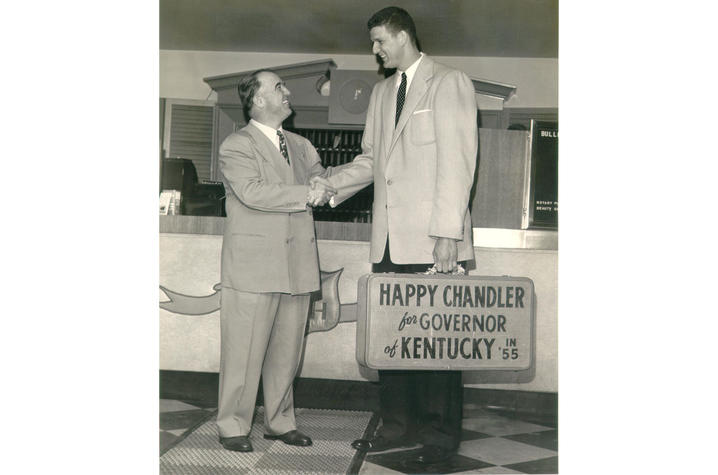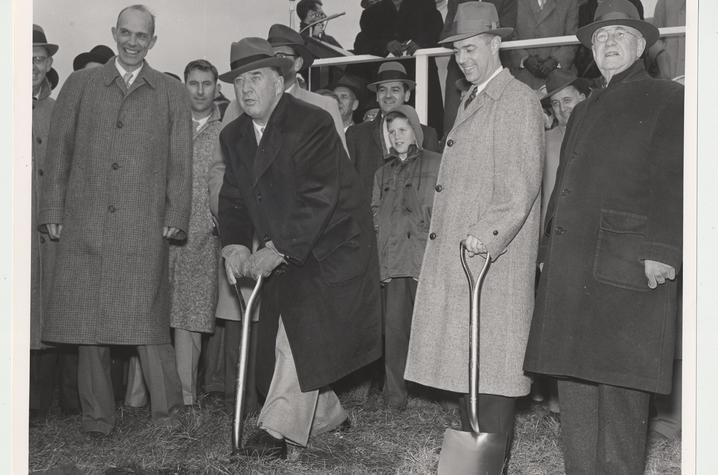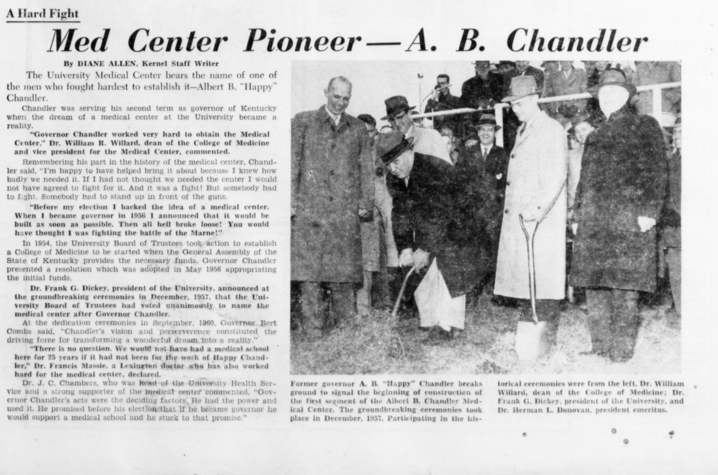Ben Chandler III honors the legacy of his grandfather, A.B. “Happy” Chandler
LEXINGTON, Ky. (Oct. 12, 2022) — On April 24, 1962, the University of Kentucky made history when it opened the doors of its first medical facility, now known as the UK Albert B. Chandler Hospital.
Former Kentucky Gov. Albert Benjamin “Happy” Chandler was the driving force behind the establishment of the hospital that now bears his name. Over the past 60 years, the original UK medical facility has evolved into the UK HealthCare system, now operating three hospitals — UK Chandler, UK Good Samaritan and UK Kentucky Children’s Hospital — in addition to managing Eastern State Hospital. UK HealthCare is home to some of the most complex health care treatments and provides health care services across Kentucky through its many outpatient clinics as well as partnerships and affiliations with community hospitals.
This weekend, UK HealthCare will celebrate its 60th anniversary with a variety of events Oct. 13-16. To honor the man who helped establish UK’s first medical center, we caught up with his grandson, Albert Benjamin Chandler III, to get his perspective on his grandfather’s legacy.
Ben Chandler is a Versailles native and a two-time UK graduate, and he has spent most of his career in public service. He served for four years as Kentucky’s state auditor, eight years at Kentucky’s attorney general, and spent nearly a decade as a member of Congress.
Currently, Chandler is the CEO of the Foundation for a Healthy Kentucky, a statewide nonprofit whose goal is to improve the health of Kentuckians from one end of the state to the other.
Q: Tell us a little about your grandfather, Albert B. Chandler I.
CHANDLER: He grew up in Henderson, Kentucky, in really very poor circumstances. And made his way up — really, a quite compelling story — to Transylvania University as a young man. He lived in the basement of the president's house at Transylvania. He was a star on the football team, the basketball team and the baseball team. He was basically captain of all three of those teams, and then became a football coach.
After he graduated from Transylvania, his first job was coaching what now is Woodford County High School. At that time, it was Versailles High School, and he still has the winningest record as football coach in high school history in Woodford County. He did all that while also attending UK's law school, so he was a very busy individual. By the way, in 1965 he was also voted the most prominent alumni in UK's 100-year history.
His whole goal in life was to be head football coach at Centre College, and he applied for that job, and didn't get it. And that's when he went into politics, and he served in Kentucky politics for about 60 years.
Q: Albert B. Chandler had a long and storied career in Kentucky politics – what are some of the highlights of his political career?
CHANDLER: He was elected as a state senator in 1929, then was elected as lieutenant governor of Kentucky in 1931.
In 1935, he served his first term as governor of the state, then was elected to the United States Senate, where he served for six years before being named commissioner of Major League Baseball. He was the commissioner who brought Jackie Robinson into baseball, which was one of the greatest racial equity advances that we've had in the history of the country. It was seven years before Brown v. Board of Education, so it was really quite a seminal event.
After that, he ran again to become governor, and was elected in 1955 for a second term. It was a generation after his first term. And of course, a lot of people who knew him the first time around were gone by the time he ran in 1955, and the next generation didn’t know him yet. So his campaign theme was, “Be like your pappy and vote for Happy.”
Q: The flagship hospital at UK HealthCare bears his name — the UK Albert B. Chandler Hospital. Can you tell us about his role in making this hospital happen?
CHANDLER: During his second run for governor, he talked eloquently on the campaign trail about the health problems that the eastern part of the state faced. Eastern Kentucky had a high rate of infant mortality, they had several counties that had no physician at all, and almost no health care whatsoever.
And he felt like an institution was needed, which not only educated health care providers who would then fan out across the eastern part of the state, but also a place where people from Eastern Kentucky could come to get health care. He campaigned on that during the 1955 election. When he was elected in 1955, he went about the business of trying to make his campaign pledge a reality: to establish the medical school here at the University of Kentucky.
Now, at that time not only was he governor, but he was also chairman of the board at UK. So he wore two hats, and it put him in a position to really have an enormous amount of say both in what UK wanted to have done, and in what needed to be done at the state level.
He worked very hard to get it done, and ultimately got it passed, and he got the first significant appropriation for the building of the hospital. Now, it took several years to get it up and running. From the time he was campaigning in 1955, it took seven years to actually open the facility.
Q: What has been the impact of the UK Albert B. Chandler Hospital?
CHANDLER: In the 60 years since it's been open, the good that it has done is just incalculable. There's just no way you can describe it. Not only do you have the medical benefits that accrue as a result of the establishment of this institution, but the economic advantages that are connected with it.
UK HealthCare is one of the largest employers in Lexington and Central Kentucky. And if you can think about the importance of this from an economic standpoint for the city of Lexington, it really just boggles the mind. There are very few things that have happened economically in Lexington that have been as important as the establishment of this medical facility.
I think he would be really astonished at the growth and at the stewardship that has taken place throughout these years. He would be very, very proud of the people who were instrumental in building this institution. And he would just be incredibly proud of their stewardship of it over the years, and probably pretty surprised at just how dramatic its effect has been.
It all started in 1962, but the hospital’s impact is still tremendous today. The lives that have been saved here, the lives that have been improved, no one could know that number. The health care providers, nurses, doctors, dentists, researchers and more who have studied here or worked here — those people have also gone out and impacted citizens throughout this state, the country, and frankly, throughout the world.
So, the hospital and medical school really has had an enormous effect, and we all here in Kentucky ought to just be tremendously proud of this institution, and of all the people who've been connected with it. It's a beacon here in the Commonwealth of Kentucky.
Learn more about the history of UK HealthCare and UK Chandler Hospital here.







As the state’s flagship, land-grant institution, the University of Kentucky exists to advance the Commonwealth. We do that by preparing the next generation of leaders — placing students at the heart of everything we do — and transforming the lives of Kentuckians through education, research and creative work, service and health care. We pride ourselves on being a catalyst for breakthroughs and a force for healing, a place where ingenuity unfolds. It's all made possible by our people — visionaries, disruptors and pioneers — who make up 200 academic programs, a $476.5 million research and development enterprise and a world-class medical center, all on one campus.




